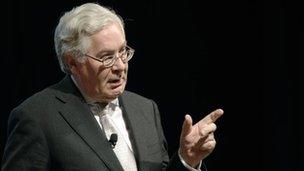Sir Mervyn King says economic recovery on its way
- Published

Sir Mervyn King said he was seeing signs of economic growth
The Bank of England governor, Sir Mervyn King, says economic growth is on its way.
In a wide-ranging live interview with Channel 4 News, Sir Mervyn said he did not have a crystal ball, but that the next quarter would probably show a pick-up in activity.
He said he was beginning to see a few signs of a recovery, albeit a slow one.
He said a lot depended on resolving the eurozone crisis, which was hanging over the UK like a "black cloud".
Sir Mervyn said: "I think the next quarter will probably be up. I think we're beginning to see a few signs now of a slow recovery, but it will be a slow recovery.
"After a banking crisis one can't expect to get back to normal and I fear it will take a long time."
The UK economy is currently in a double-dip recession - two-quarters of negative growth followed by a return to expansion and then another fall in activity.
He also spoke about the government's deficit-cutting plans, which are designed to curb the gap between spending and income by 2015.
He said it would be acceptable if that target was missed, as long as it was a result of slower global economic growth.
Banking system 'safer'
Asked about the stability of the banking system in the wake of the crisis that saw leading banks needing a taxpayer-funded rescue, Sir Mervyn said the taxpayer would have to step in again in any future crisis, but that it would be for a shorter period of time.
Sir Mervyn told the programme: "I think temporarily the taxpayer would have to provide finance [if a big bank went bust] but we would be able to get control of the bank very quickly as we have a system that wasn't in place when Northern Rock went bust."
He said more needed to be done to make sure the banking sector was returned to health: "We have to make our banking system safer. We can do it and we must."
He said that the management attitude at the banks was changing, and that those in charge now would be "shocked" at some of the activities banks had been found to be involved in, such as HSBC and its money laundering in Mexico.
He said the recent report by Sir John Vickers, which recommended banks cut their reliance on borrowed money as well as split in to two parts to separate the High Street banking side from the riskier investment side, provided good solutions but had been watered down.
"What we have to do is straightforward, we have to change way banks finance themselves.
"They don't get money from shareholders in the same way as businesses do, they fund themselves by borrowings. It is important we impose limits on how much banks can fund themselves through such borrowings."